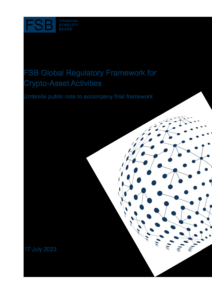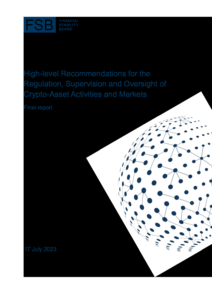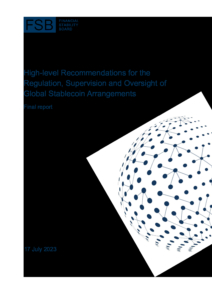Press enquiries:
+41 61 280 8477
[email protected]
Ref: 22/2023
-
Final recommendations incorporate learnings from events of the past year in crypto-asset markets and feedback received during the FSB’s public consultation.
-
Framework is based on the principle of ‘same activity, same risk, same regulation’ and provides a strong basis for ensuring that crypto-asset activities and so-called stablecoins are subject to consistent and comprehensive regulation, commensurate to the risks they pose.
-
The FSB and standard-setting bodies will continue to coordinate in promoting globally consistent regulation by considering the need for further guidance or standards and monitoring implementation status at jurisdictional level.
The Financial Stability Board (FSB) today published its global regulatory framework for crypto-asset activities to promote the comprehensiveness and international consistency of regulatory and supervisory approaches.
The events of the past year have highlighted the intrinsic volatility and structural vulnerabilities of crypto-assets and related players. They have also illustrated that the failure of a key service provider in the crypto-asset ecosystem can quickly transmit risks to other parts of that ecosystem. As recent events have illustrated, if linkages to traditional finance were to grow further, spillovers from crypto-asset markets into the broader financial system could increase.
The G20 tasked the FSB to coordinate the delivery of an effective regulatory, supervisory and oversight framework for crypto-assets. The framework takes account of lessons from events of the past year in crypto-asset markets and feedback received during the FSB’s public consultation.
The framework consists of two distinct sets of recommendations:
The final recommendations draw on the implementation experiences of jurisdictions and build on the principles – ‘same activity, same risk, same regulation’; high-level and flexible; and technology neutral – that informed the consultative framework. In light of events of the past year, the FSB has strengthened both sets of high-level recommendations in three areas: (i) ensuring adequate safeguarding of client assets; (ii) addressing risks associated with conflicts of interest; and (iii) strengthening cross-border cooperation.
The recommendations focus on addressing risks to financial stability and do not comprehensively cover all specific risk categories related to crypto-asset activities. Central Bank Digital Currencies (CBDCs), envisaged as digitalised central bank liabilities, are not subject to these recommendations.
The FSB has been working closely with the sectoral standard-setting bodies (SSBs) and international organisations to ensure that the work underway regarding the monitoring and regulation of crypto-asset activities and markets is coordinated, mutually supportive, and complementary. The global framework includes a shared workplan that the FSB and SSBs have developed for 2023 and beyond. Through this, they will continue to coordinate work under their respective mandates to promote the development of a comprehensive and coherent global regulatory framework, including through the provision of more granular guidance by SSBs, monitoring and public reporting.
Notes to editors
In February 2022, the FSB published an Assessment of Risks to Financial Stability from Crypto-assets, which examined developments and associated vulnerabilities in crypto-asset markets, including stablecoins and DeFi.
In October 2022, the FSB published A proposed framework for the international regulation of crypto-asset activities, in the form of two separate sets of recommendations, for a public consultation that ran until 15 December 2022. A summary of the consultation responses, together with the individual responses, has been published separately.
The FSB coordinates at the international level the work of national financial authorities and international standard-setting bodies and develops and promotes the implementation of effective regulatory, supervisory, and other financial sector policies in the interest of financial stability. It brings together national authorities responsible for financial stability in 24 countries and jurisdictions, international financial institutions, sector-specific international groupings of regulators and supervisors, and committees of central bank experts. The FSB also conducts outreach with approximately 70 other jurisdictions through its six Regional Consultative Groups.
The FSB is chaired by Klaas Knot, President of De Nederlandsche Bank. The FSB Secretariat is located in Basel, Switzerland, and hosted by the Bank for International Settlements.


